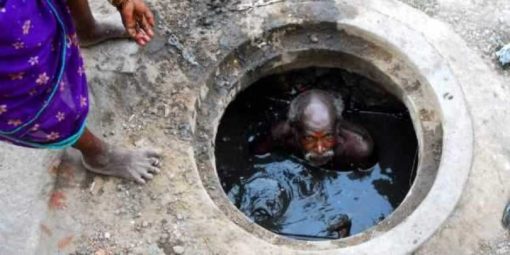
The 2011 Socio-Economic Caste Census found that 1,80,657 Indian households are still engaged in manual scavenging for a livelihood. The burden of this figure, very likely an underestimate, is hard to comprehend.
On June 14 seven people suffocated to death in Gujarat while cleaning a hotel’s septic tank. Four were sanitation workers hired by the local municipality. The state government worked for the dead, announcing compensation of ₹4 lakh to the families of those who had died. The case is still pending in court.
The recorded death rate from this dangerous caste-bound occupation has been increasing since 2013. A survey by the Safai Karamchari Andolan (Sanitation Workers’ Association or SKA) revealed that in 2016-17, in Delhi alone, 429 people died from manual scavenging.
Why does this frightening state of affairs continue? The construction of dry latrines became a punishable offence back in 1993, when Parliament enacted the Employment of Manual Scavengers and Construction of Dry Latrines (Prohibition) Act. And after the SKA’s continuous intervention, in 2013 Parliament passed the Prohibition of Employment as Manual Scavengers and their Rehabilitation Act.
Yet the situation remains paralysed or worse. We interview SKA national convenor Bezwada Wilson to discover why.
Why does the practice of manual scavenging continue?
Law enforcement in the country is not working, and there is no “political will”. If the political will were there, government agencies would act in a different way. The matter is taken lightly by every ministry because they don’t have the will to resolve it.
The second reason is ages old: caste and patriarchy. It is difficult to address manual scavenging without addressing these issues, but caste and patriarchy have never been addressed to tackle manual scavenging.
The government will not agree it is a caste based occupation. They will announce, We are constructing a toilet. Fifteen people will be given 40,000 rupees. All done. But nothing will be accomplished this way.
There should be an action plan and the political will to implement it. It is very weak right now, that’s why the problem persists.
Quite often it is government bodies which employ manual scavengers. What role does the political class play in this exploitation?
The problem is that the majority of government agencies, officers and politicians say things like “If these people don’t do such work, then who will?”
This is putting their subjective notion into policy. Then they talk about eradication! If they begin the work with conviction, it will result in the eradication of manual scavenging.
At present nobody is punishing anybody – and because government agencies have this attitude, those who employ scavengers are afraid of no one.
If the agencies were to perform their task properly, those employing manual scavengers would all go to jail. They will be afraid and will not employ people to do this work.
Government agencies are not honest. On one hand they exhibit the laws and on the other, they themselves hire people for this work.
Everyone should question this dichotomy on a judicial level. They get away with saying “It is a complex problem.” But they are not respecting the Constitution of India, or law, or anything.
What needs to be done to end this form of exploitation?
The first and foremost thing is the law. Strict implementation of the law in full spirit. If any officer is involved in employing people for manual scavenging then strict action should be taken.
The second is rehabilitation. Many people want to leave this work. They want to come out of this domain. The government is not doing enough for them.
The third is dry latrines should be either demolished or converted. Neither is happening at present. We are constructing new toilets but are not demolishing existing dry latrines at all.
What do you think about the introduction of automatic scavenging machines?
Understand this. We cannot face the time where someone enters a manhole. We must engage and develop a mechanised way of cleaning them. But the government doesn’t have any such equipment. They tell private companies to prepare 2 machines. So they make 2, 15, 20 or 200 machines to show off India’s prowess.
They just want to show that they are doing something. But they’re only playing to the gallery. There is nothing happening. They are finding solutions to just one percent of the problem, and even that one percent is not done properly.
Governments are organising many projects, but they are not calculating the proportion of mechanisation needed in even one big city. That is the reason why people are still dying.
What effect has the Swachh Bharat Abhiyan had on manual scavenging?
Swachh Bharat is detrimental to the eradication of manual scavenging. Whatever focus there was on eradication has been shifted to constructing toilets. This is why progress on manual scavenging has been so slow the past 5 years.
There is almost no focus on it now. The Swachh Bharat Mission and every government missionary is focused on constructing toilets. Nobody is talking about the manual scavengers any more.
Before 2014 the topmost priority was to eradicate manual scavenging. Everyone was uptight about it, they used to feel bad about the practice and the system.
But because Swachh Bharat was initiated by the Prime Minister, no one gives importance to eradicating manual scavenging. The Prime Minister is the reason manual scavenging continues to exist.




